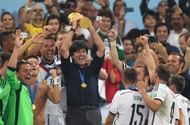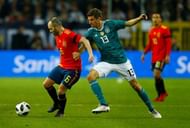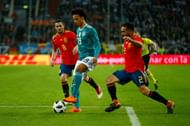
The German national football team will be seeking to become the first country since the beginning of the 21st century to successfully defend the FIFA World Cup; the biggest football event in the world.
The German team played a 1-1 draw against Spain on the 23 March and will play the Brazilian Samba boys on Tuesday, 27 March in their first phase of friendlies that will prepare them for the upcoming tournament in the summer.
Here are 5 reasons why the Germans will retain the FIFA World Cup title in Russia:
#5 They Are ruthless

Unlike other teams who feel comfortable with a 2-goal margin against their opponent, the German team hunger for goals is unrivalled. They always continue to hit teams with enormous pressure, even after they have been guaranteed a win.
Germany has been the most scoring nation in three consecutive World Cup editions. The scored 14 goals at the 2006 World Cup, 16 goals in South Africa 2010 and 18 goals in their World Cup triumph in 2014.
They annihilated Saudi Arabia, in a humiliating 8-0 defeat at 2002 World Cup opener, a tournament they played unbeaten until they lost to Brazil in the final.
They put 4 goals past Australia, England, and Argentina at the 2010 edition, a tournament that saw Thomas Muller winning the FIFA Golden Boot and FIFA Young Player of the competition at the age of 19. The German team also thrashed Portugal 4-0 in their opening game at the 2014 tournament, defeating Brazil 7-1 in the semi-final. The humiliating defeat was Brazil greatest defeat at the FIFA tournament.
The Joachim Low led side were one of the first teams to qualify for the World Cup in Russia, winning all their 10 matches in their group, consisting San Marino, the Czech Republic, Northern Ireland, Norway and Azerbaijan.
Germany put eight goals past San Marino, six goals past Norway and five past Azerbaijan in their last three World Cup qualifier games, even after being assured of qualification, scoring a whopping 43 goals and conceding merely four games in 10 matches.
#4 Joachim Low's influence

Low was appointed gaffer of the German national team after the resignation of Jurgen Klinsmann in 2008. Low immediately started improving on his predecessor's coaching philosophy by introducing critical tactics that ensured the players never keep on to the ball longer than necessary.
Low is an integral part of German grassroots football development, as he consistently introduces brilliant home-grown talents into the team. This new development has ensured that the world recognizes Germany as a power-house in developmental football.
As the coach of the German national team, Low has had his own share of misery as well, losing his first chance at European glory to Spain – courtesy of Fernando Torres’s first-half goal in 2008. He also met the same fate when he met Del Bosque's men at the semi-final of the 2010 World Cup in South Africa.
These defeats challenged his pressure playing style, with critics from various sectors; and general applauds to the Spanish style of play. Low bounced back from these successive defeats to edge pass world football powerhouse in Portugal, France, Brazil and Argentina to claim the FIFA 2014 glory in Brazil.
Apart from the Uruguayan Oscar Tabarez, Low is the longest serving National team coach at the World Cup (11 years, 10 months) and he will be the only World Cup winning gaffer in Russia
#3 They are highly disciplined

When people talk about the “German Machines”, it can also be a synonymous term with country's football style of play –They are highly disciplined and efficient.
Unlike the Spanish 'La Furia Roja' “tiki-taka” possessive style of play, the German team plays a high-pressure kind of game, where they keep you away from their 18-yard box, lets you get tired trying to run at their solid defending and punish teams with their deadly counter-attacks. They have fantastic pace running from the wings and do not waste time with the ball.
Little wonder they conceded four goals and scored a massive 18 goals on their way to the FIFA 2014 title in Brazil.
German players are known to adhere strictly to their specific roles and are hardly found playing out of position, which makes goals conceded from counter attacks a rare sight. Although many might not find the Die Mannschaft style of play attractive, it has been very effective in 21st-century football.
.
#2 They Have Excellent Squad Depth

Leroy Sane's omission from Germany's 23-man final World Cup list has yet again proved the versatility and squad depth of the defending champions.
Football lovers around the world were surprised when the German tactician, Joachim Low opted for German second squad to represent the national team at the 2017 FIFA confederation tournament in Russia, including 7 players who were eligible to play for the German U-21. Low dropped many important members of the German Starting line-up like Thomas Muller, Mats Hummels, Badstuber, Jerome Boateng, Mesut Ozil, Sami Khedira, Marco Reus etc.
Also read: 3 reasons why Sane's exclusion from the German squad makes sense
Germany winning the Confederations Cup with a weakened senior squad is no mean feat, it is just an indication of the excellent German squad depth who will be at 2018 FIFA World Cup in Russia.
The recently released 23-man final World Cup list a very experienced one, with over 90 percent of them winning either the 2014 FIFA World Cup or 2017 FIFA Confederations Cup.
#1 They are the Definition of a "Team"

Their mentality is never built upon individual glory but on fluidity and the excellence in teamwork. Unlike many other football teams, whose moment of glory often relies on the performance of their respective star players, the German national team is built on the importance of extraordinary team-spirits, which prioritises collective responsibility over individual brilliance.
At important moments, teams like Brazil depends on the individual brilliance of Neymar Jr., Lionel Messi is pivotal to Argentina's success in the field, Cristiano Ronaldo literally carries the Portuguese team but the Germans? They have a team!
We often see teams using the "trap the star player, trap them method" where opponents render their opposition ineffective due to team's ability to successful contain their most influential player. This method can't work with Germany, as every player is capable of punishing opponent at the slightest mistake.
Cristiano Ronaldo netted 15 times during the 2018 World Cup qualifiers, a tally that amount to 47 percent of Portugal's total goals. Germany highest goal scorers during the World Cup qualifiers were Thomas Muller and Sandro Wagner who scored 5 goals each, with eighteen other players seeing the back of the net in their 43 goals qualifier rampage. These figures are the manifestation of Germany's "teamwork" when compared to any other Countries.
The German team capability is evident in Low's decision to opt for a predominantly second-team player for the 2017 Confederations Cup and eventual rotation of the Under-21 squad during the World Cup Qualifiers.
